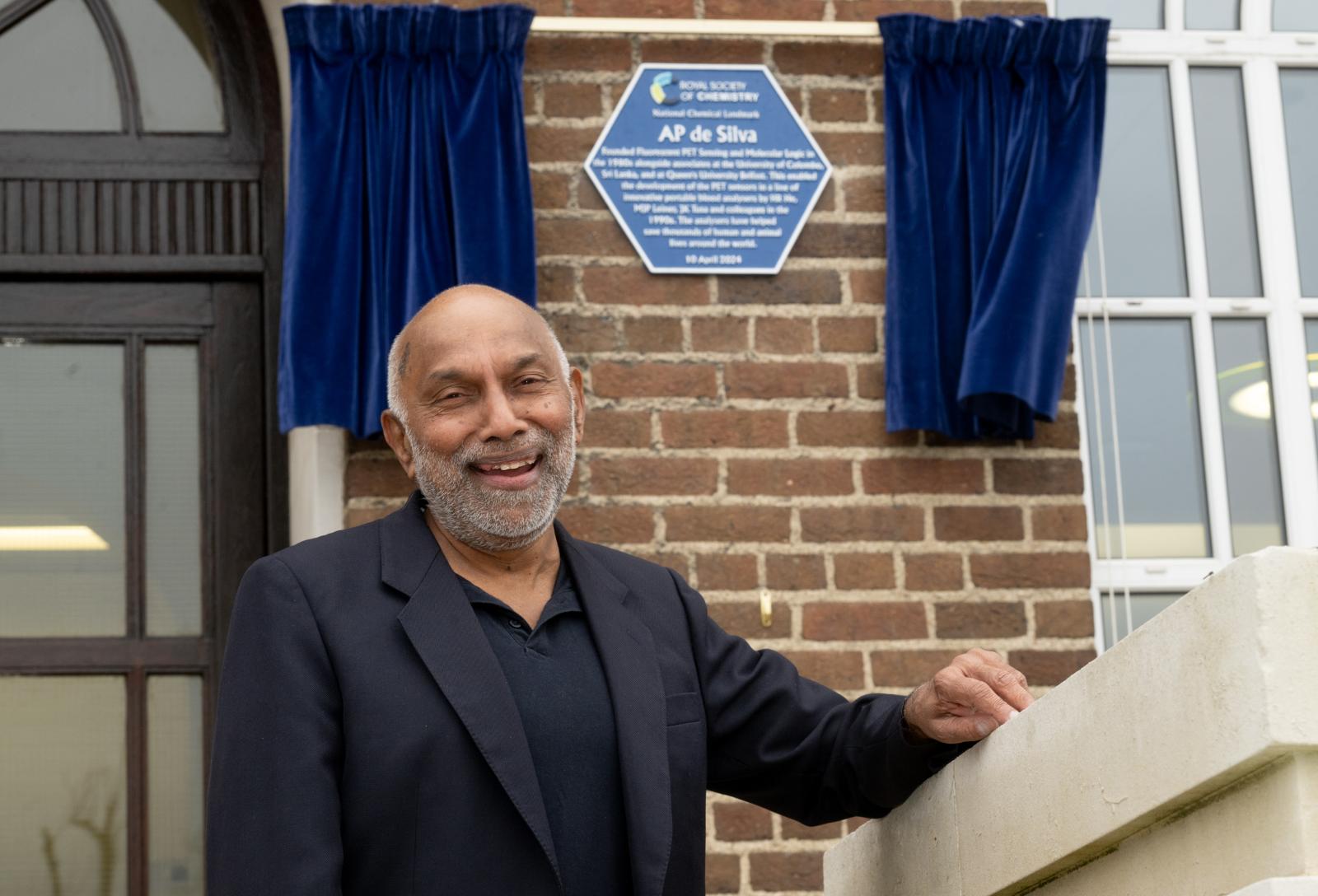Esteemed ex-Queen’s professor AP de Silva honoured with Royal Society of Chemistry blue plaque
A chemistry professor whose research was responsible for the development of a life-saving piece of medical equipment has been honoured with an illustrious blue plaque at Queen’s.
Professor AP de Silva said he was ‘bowled over’ as his contributions to science were recognised with a National Chemical Landmark from the Royal Society of Chemistry.
A formal unveiling of the plaque preceded a special event reuniting the popular academic with hundreds of friends and colleagues from throughout his lengthy career.
The retired researcher, 72, was selected to receive the award as a permanent tribute to a career that included a major discovery that transformed emergency medical care.
Just 68 of these plaques have been awarded by the Royal Society of Chemistry, with more than half a dozen Nobel Prize winners on that list. Another recipient is Queen’s chemistry pioneer Thomas Andrews, whose work in the 1800s established the Northern Irish capital as a scientific hotspot.

Prof de Silva, who hails from Sri Lanka and first moved to Belfast in 1976, retired in 2022 after spending two stints totalling more than 40 years at Queen’s. He was stunned to hear he was being honoured when he was told late last year – and the feeling has still not quite fully sunk in.
He said: “I'm just bowled over by the whole thing, even now. To be honest, I still haven't quite come to terms with it, it’s very humbling. Kevin asked to speak with me one day five or six months ago and I had no idea what he wanted to discuss – it never entered my head that it might have been about something like this – and he said he had put me forward. If he had proposed this before asking me, I would have said: ‘Don't be silly, I’m not in the league of other people on the list at all’ but I am very appreciative that he did.
“I feel such gratitude because this is the standard the RSC has to maintain so I am touched.”
RSC representatives felt compelled to honour the impact of Prof de Silva’s 1985 research, on fluorescent pH indicators based on photo-induced electron transfer. This breakthrough led to the development of a blood electrolyte analyser with multinational healthcare giant Roche. These analysers are still used in A&E departments around the world, measuring levels of vital salts and minerals in seriously injured patients’ blood in just 30 seconds.
A popular figure, Prof de Silva’s profile on campus resonated beyond just those who studied chemistry. Professor Stuart Elborn, Provost and Deputy Vice-Chancellor and Professor Panagiotis Manesiotis, Head of School of Chemistry and Chemical Engineering, both gave speeches on behalf of Queen’s at the University’s David Keir Building, where the plaque will be displayed.
Queen’s President and Vice-Chancellor Professor Sir Ian Greer said: “This blue plaque is a fitting accolade to honour Professor de Silva’s contribution to the University and to the wider world. I would like to thank the Royal Society of Chemistry for their continued commitment to honouring chemical scientists who have made an invaluable improvement to society through their work.”
Yesterday’s event attracted hundreds of familiar faces, with some travelling from as far as the United States, Sri Lanka and China to celebrate Prof de Silva, who also studied at and taught at the University of Colombo in his homeland. As well as former colleagues and research partners, a host of musicians that have played with drummer Prof de Silva also attended the evening event at Riddel Hall.
Dr Kevin Morgan, who works as a chemistry lecturer at Queen’s, was the person who nominated Prof de Silva for the honour. Before the two were colleagues, Dr Morgan was also a student of his and that time provided some – but not all – of the inspiration to put him forward.
“It was those memories from the classroom [that inspired me to put him forward],” he explained. “I've been here for undergraduate, PhD, postdoc and now as lecturer but one of the things I most remember is him teaching molecular logic and sensors and he uses an analogy about James Bond.
“Those stay with you, but then you think about what he’s achieved in research, too – he was teaching here in Queen’s but he had this also international reach, helping people and saving lives.”
He added: “We've been able to get almost every single head of school since he joined in 1976 to come. Not all of them live locally anymore so they are travelling from far and wide – they wouldn’t do that for just anyone. It says a lot about the kind of person AP is.”
Media
Media enquiries to comms.office@qub.ac.uk.